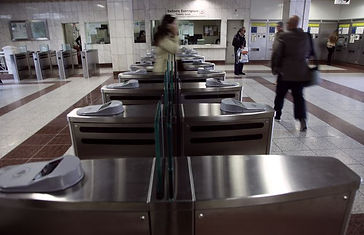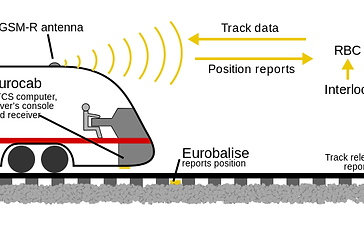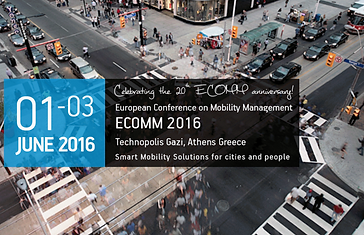With the contribution of the LIFE programme of the European Union - LIFE14 ENV/GR/000611
PROJECT
ARTICLES
01 Sep 2019
Public transport priority systems
Public transport priority systems could help public transport means to become more attractive to passengers. Those kinds of systems are installed at traffic lights and detect busses and trams approaching and ensure that the vehicle gets a green light when arriving at the junction. This way public transport becomes faster and more reliable, especially during high congestion hours in big urban environments.
Source: CIVITAS
21 Aug 2019
Transport trends and issues in Czech Republic, Greece and Slovak Republic
Transport activity across Europe is high, and set to continue growing. Estimates suggest that passenger transport will increase by 42% by 2050, and freight transport by 60%.
Source: European Commission
21 Aug 2019
Women in transport
Employment in transport is by far male dominated compared to the rest of the economy. The share of women working in the EU transport sector is only 22% while the share of women working in the entire European Union is 46%.
Source: European Commission
28 Jul 2019
Towards greener trains, producing zero emissions
The French company Alstom invented and manufactured the first train in the world that moves from point A to point B without emitting a single molecule of carbon dioxide!
Source: Kathimerini
24 Jul 2019
E-ticketing in Greece
Most gates have been closed, revenues increased, but many problems remain, causing discomfort to the traveling public. This is in a few words the report of the first period of application of the electronic ticket in public transport in Greece.
Source: Huffington Post
24 Jul 2019
The Concept of Co-Modality
The European Commission has attempted steady endeavors to encourage the modular move in the cargo coordination’s showcase over the most recent 10 years as a way to keep up and strengthen the landmass' monetary aggressiveness, and to decrease ozone depleting substance emanation and to achieve the goal to lessen CO2 by 80-95% beneath 1990 levels by 2050.
Edited by: LIFE GYM project team
14 Jul 2019
Free public transport: Estonia shows the way
In 2013, Tallinn, the capital of Estonia, decided after a referendum to establish free public transport exclusively for its city residents. However, according to a survey conducted in Tallinn in 2016, the city's free travel system has not discouraged the city's inhabitants from not using their car.
Source: Naftikachronika.gr
08 Jul 2019
Promotion of clean and energy-efficient buses and available infrastructure
The European Council has recently adopted an EU directive with binding targets for zero and low emission vehicles in public procurement in all Member States. However, without the specific charging infrastructure necessary for buses, these targets cannot be achieved.
Source: Fleet news
01 Jul 2019
The future of buses is electric
electrification does not only affect personal cars but also public transport. Recently, several cities around the world have incorporated into their transport fleets both hybrid technology and pure electric buses.
Source: Athens Transport
24 Jun 2019
Transport timetables re-scheduling
The problem of transport timetables re-scheduling refers to the adjustment of the execution times of trips. Trips, in most cases, are services that utilize the different means of transport in order to move people, and in some cases commodities, from one place to another.
Edited by: GreenYourMove project team
22 Nov 2018
MORE-Multi-modal Optimisation for Road-space in Europe
MORE (Multi-modal Optimisation for Road-space in Europe) is a project launched on September 1st, 2018, funded under H2020-EU.3.4. - SOCIETAL CHALLENGES - Smart, Green And Integrated Transport program.
Source: Cordis
21 Nov 2018
European Rail Traffic Management System (ERTMS)
The European Rail Traffic Management System (ERTMS) is a single interoperable train control and command system in the European Union. It enhances cross-border interoperability, creating a seamless, EU-wide railway system. The EU Agency for Railways is the system authority for ERTMS.
Source: ERTMS
21 Nov 2018
European Mobility Week 2018
European Mobility week 2018, dated within 16 and 22 September 2018, was dedicated to multimodality, the combination of different modes of transport within the same journey or for different trips. The participation hit a new record, since 2,800 towns and cities from 54 countries took part. LIFE GreenYourMove project’s awareness campaign was also performed within the European Mobility week with a number of activities.
Source: mobilityweek.eu
21 Nov 2018
5th European Conference on Sustainable Urban Mobility Plans (SUMPS)
The 5th European Conference on Sustainable Urban Mobility Plans (SUMPS) took place on 14-15 May 2018 in Nicosia, Cyprus. The conference was addressed to a wide range of potential participants comprising representatives from professional and scientific communities in the public and private sectors as well as associations and individuals, enterprises and suppliers, involved in the mobility of people. The conference was co-funded by the European Commission in cooperation with the Municipality of Nicosia and the Ministry of Transport, Communications and Works of the Republic of Cyprus.
21 Nov 2018
Ten-T days 2018 in Ljubjana, Slovenia
TA ten-t day event took place in Ljubjana in Slovenia on 25-27 April 2018. The event that was supported by European Commissioner for Transport Violeta Bulc, who invited Ministers, Members of the European Parliament and key stakeholders to chat over sustainable transportation, smart and safe public networks and connectivity issues.
Source: click here.
21 Nov 2018
European multimodal freight transport for better transport connectivity conference
Key transport stakeholders were invited by European Commissioner for Transport Violeta Bulc and Bulgarian Minister of Transport, Information Technology and Communications Ivaylo Moskovski to a high-level conference on European Multimodal Freight Transport, at the National Palace of Culture in Sofia, on 20 March 2018.
Source: European Commission
11 Jun 2018
Europe on the Move: Commission completes its agenda for safe, clean and connected mobility
In his State of the Union address of September 2017, President Juncker set out a goal for the EU and its industries to become a world leader in innovation, digitisation and decarbonisation. Building on the previous 'Europe on the Move' of May and November 2017, the Juncker Commission is today putting forward a third and final set of measures to make this a reality in the mobility sector. The objective is to allow all Europeans to benefit from safer traffic, less polluting vehicles and more advanced technological solutions, while supporting the competitiveness of the EU industry.
Source: Mobility and Transport
17 Apr 2018
Consumption-based and transboundary GHG emissions of C40 cities
C40’ scope is to generally support cities to collaborate effectively, share knowledge and drive meaningful, measurable and sustainable action on climate change.
C40 cities network, a network of the world’s megacities committed to addressing climate change, recently published a study investigating the consumption-based greenhouse gas emissions from 79 cities in partnership with the University of Leeds (UK) and the University of New South Wales (Australia).
Source: Intelligent Transport
30 Nov 2017
Energy Union
Commission takes action for clean mobility package
The Commission took a decisive step forward in implementing the EU's commitments under the Paris Agreement for a binding domestic CO2 reduction of at least 40% till 2030.
Source: European Commission
20 Mar 2017
C-ITS Roadmap for European cities
Add some more info about this item...
CIMEC project funded from EU Horizon 2020 research and innovation programme deals with Cooperative ITS for Mobility in European cities. Its primary aims are to understand potential benefits and impacts of cooperative intelligent transport systems (C-ITS) on urban environments, since most of the work to date has been focused heavily on the highways context.
Source: European Commission
20 Mar 2017
Brief presentation of EU Strategy for Low – Emission Mobility
The European Commission published the European Strategy for low-emission mobility 7 months ago with the aim to modernise EU economy, reduce emissions from transport sector and meet EU’s commitments under the Paris Agreement.
The strategy sets clear and fair guiding principles to Member States to prepare for the future and shift to low-emission mobility in terms of carbon and air pollutants.
Source: European Commission
23 Dec 2016
Air pollution is a worldwide problem crossing national borders. It is a matter of international concern; though, governmental and public authorities at all levels should take advantage of Commission’s help in order to take action and make each one of us alert when it comes to adopt green technologies or make use of public transport or adopt an alternative methodology in the agriculture sector.
Source: European Commission
11 Nov 2016
Prediction is a useful tool for engineers and transportation companies. Rolling stock maintenance is one of the most important pillars in railways. Good fleet maintenance helps a railway company to improve the fleet availability and reduce problems in services and supply of goods.
Source: Railwaygazette
04 Nov 2016
According to the UIC and IEA, the transportation sector is responsible for almost 23% of CO2 emissions worldwide. That problem is does not only apply in environmental issues, but it also affects transportation costs.
12 Oct 2016
European Train Control System is a signalling, control and train protection system designed to replace the many incompatible safety systems currently used by European railways.
Source: ALSTOM
03 Oct 2016
Good news from Hellenic region. TRAINOSE announced in Thessaloniki International Fair that plans to implement a new type of “smart ticket” for reducing paper waste in ticketing procedures. This is going to happen with implementation of a new electronic – non printable ticket.
Source: Metaforespress.gr
18 Sep 2016
One of the most famous high speed trains worldwide are the Deutsche Bahn’s ICE trains.
Source: RailwayGazette
15 Sep 2016
In the past, a public transportation transit would require a route map, perhaps a contact via telephone with the route operator, or even a visit from the operator's agency.
08 Sep 2016
One of the biggest problems in railway industry comes from delays.
Source: RailwayGazette

31 Jul 2016
Tram-train conquers Paris
Tram-trains win another contract in European region.
Source: RailwayGazette

14 Jul 2016
Bus stops in Thessaloniki are turned into innovative libraries
In Filiro, Thessaloniki five bus stops made of stone are transformed into innovative sites for reading.
Source: LIFO

14 Jun 2016
OASA Telematics – Information about public transport in real time
Real time information about public transport is important in urban areas where thousands of citizens travel by means of transport and especially when the congestion on roads can affect their transportations and consequently every planned activity. OASA developed the OASA Telematics application, which provides real time information about the city buses in Attica prefecture.

15 May 2016
ACEPT – AIR & NO2 ICAD: Innovative tools for measuring PM and NOx in air
The increased concentration of airborne particulate matter (PM) and nitrogen oxides (NOx) in the atmosphere of many European cities is still a major environmental problem. Therefore, many research teams across Europe have been looking into these matters and have developed calculation models and innovative tools, in order to estimate the level of PMs and NOx in the air.

13 Dec 2015
Three digital Master Keys: The beginning of smart electronic ticketing system in public transport in Attica
The Greek Minister of Infrastructure, Transport and Networks, Christos Spirtzis, announced the launch of smart electronic ticketing system in public transport in Attica.
Resource: Ministry of Infrastructure, Transport and Networks

11 Dec 2015
How to meet people’s needs in order to make informed decisions and select their preferred transport mode everywhere at any time? IT-TRANS 2016
On the occasion of IT-TRANS 2016 Conference and Exhibition, a reference to the Intermodal Transport Control Systems (ITCS) and its importance is given.

09 Dec 2015
Cooperative Intelligent Transport Systems (C-ITS) – The EU funds pilot projects of 1,3M€
What are Cooperative Intelligent Transport Systems (C-ITS)?
Which are the characteristics of the projects, that are being funded by European Commission in the field of C-ITS?
Source: 2015/S 213-387533, Europa Tenders

30 Sep 2015
Transport consuming most energy in developed world
http://www.transportenvironment.org
Transport is the greatest consumer of energy in the developed world, consuming more than industry, the International Energy Agency (IEA) has found for the second consecutive year. In the EU, transport still lags behind industry in total final energy consumption, but the gap is narrowing, and road transport’s continued reliance on oil is making the sector increasingly slow to embrace lower-emission energy.

21 Sep 2015
Low-carbon cities ‘a $17 trillion opportunity’
http://www.transportenvironment.org
New research has suggested that investing in public and low-emission transport could bring massive financial savings in addition to making a sizeable contribution to reducing greenhouse gases.
New research has suggested that investing in public and low-emission transport could bring massive financial savings in addition to making a sizeable contribution to reducing greenhouse gases.
The research is presented in a report Accelerating Low-Carbon Development in the World’s Cities by New Climate Economy, an offshoot of a seven-country economy and climate initiative involving three European states (UK, Norway and Sweden). It calculates that investing in public and low-emission transport, as well as efficiency and waste management in cities, could generate savings of $17 trillion (€15.2 trillion) by 2050, and cut 3.7 Gt CO2e in greenhouse gases by 2030. It describes low-carbon cities as ‘a $17 trillion opportunity worldwide’.

21 Sep 2015
Air pollution costing global economy €143bn – World Bank
http://www.transportenvironment.org
Air pollution is costing more than $160 billion (€143 billion) a year in lost productivity, according to new data released by the World Bank. The data also show that air pollution has its greatest impact in poorer countries.
The World Bank publishes its Little Green Data Book every year, charting the exposure to harmful pollutants in more than 200 countries. The analysis techniques used for this year’s edition have moved up a level in accuracy by separating micro-particles (PM2.5) from standard particulate matter (PM10), as PM2.5 penetrate deep into the human respiratory system and can cause severe illness.
Transport is one of the principal causes of air pollution, notably through diesel emissions. T&E has criticised the European Commission for failing to set emissions limits for construction equipment that are equivalent to existing limits on trucks. It has also highlighted that modern diesel cars are emitting up to 22 times more nitrogen oxides when driven on the road than the allowed limits in obsolete tests. Nitrogen dioxide causes a range of short-term health effects, like asthma, and longer-term effects including lung cancer. T&E also highlighted that modern gasoline direct injection engines emit more particle numbers than diesels.












































